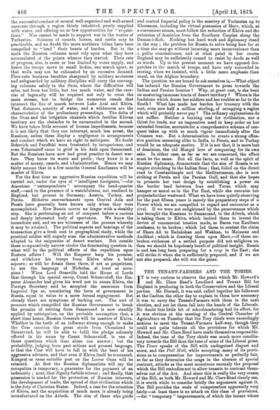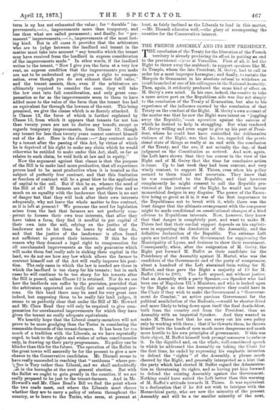THE TENANT-FARMERS AND THE TORIES.
IT is very curious to observe the panic which Mr. Howard's and Mr. Clare Read's Landlord and Tenant Bill for England is producing in both the Conservative and the Liberal parties. Mr. Disraeli, it was said, called together his followers at the Carlton the other day to explain to them how necessary it was to carry the Tenant-Farmers with them in the next election, and not let them fall into the hands of the Liberals. No doubt this little bit of schoolmastering had its effect, for it was obvious at the meeting of the Central Chamber of Agriculture on Tuesday that the Tory chiefs were exceedingly anxious to meet the Tenant-Farmers half-way, though they could not quite tolerate all the provisions for which Mr. Howard and Mr. Clare Read have made themselves responsible. Indeed, the tone of the Tory chiefs was much more concilia- tory towards the Bill than the tone of some of the Liberal press. The Times speaks of the Bill with undisguised disgust and scorn, and the Pall Mall, while accepting many of its provi- sions as to compensation for improvements as perfectly fair, so far as they determine the usage in the absence of special contract, attacks as the most monstrous anomaly the proposal which the Bill embodies not to allow tenants to contract them- selves out of the Act. And since this is really the very cream of the Bill, as both Mr. Howard and Mr. Clare Read clearly see, it is worth while to consider briefly the arguments against it. The Bill provides the scale of compensation apparently very fairly—at least there is no attack on this class of provisions, —for " temporary " improvements, of which the tenant whose term is up has not exhausted the value ; for " durable " im- provements,—i.e., improvements more than temporary, and less than what are called permanent ; and finally, for " per- manent" improvements,—i.e., improvements of the most last- ing kind. But in all cases it provides that the arbitrators who are to judge between the landlord and tenant in the matter must take into account "any benefits which the tenant may have received from the landlord in express consideration of the improvements made." In other words, if the landlord writes to the tenant, " Now I give you the farm at a very low rent, on express condition that the improvements you make are not to be understood as giving you a right to compen- sation, even though you do not exhaust their full value," and the tenant assents, then, even if the arbitrators are ultimately required to consider the case, they will take the low rent into full consideration, and only grant com- pensation so far as the improvements seem to them to have added more to the value of the farm than the tenant has had an equivalent for through the lowness of the rent. This being premised, we give the clause which is so fiercely attacked. It is Clause 12, the force of which is further explained by Clause 15, from which it appears that tenants for not less than twenty years are not to derive any benefit, except as regards temporary improvements, from Clause 12, though any tenant for less than twenty years cannot contract himself out of the Act. Here is the clause :—" Any contract made by a tenant after the passing of this Act, by virtue of which he is deprived of his right to male any claim which he would otherwise be entitled to make under this Act, shall, so far as relates to such claim, be void both at law and in equity."
Now the argument against that clause is that the purpose of the Bill is to make land more productive, that all experience proves land to be most productive when it is treated as the subject of perfectly free contract, and that this limitation or freedom of contract will be a great blow to the application of capital to the soil. But if this be so, whence the need of the Bill at all? If farmers are all so perfectly free and so much on an equality with the landowner that there is no sort of danger hut that they will look after their own interests adequately, why not leave the whole matter to free contract, as it is left at present ? We presume the need for legislation arises from the fact that farmers are not perfectly com- - petent to foresee their own true interests, that after they have taken a farm, they find it needful to put capital of their own into the soil, relying on the justice of the landowner not to let them be losers by what they do, and that the justice of the landowner is often found not sufficient to protect their interests. If this be the reason why they demand a legal right to compensation for all unexhausted improvements as the only guarantee which will make them feel really safe in sinking their capital in the land, we do not see how any law which allows the farmer to contract himself out of the Act will really improve his posi- tion. The only cases in which the law is needed are those in which the landlord is too sharp for his tenants ; but in such cases he will continue to be too sharp for his tenants after the Bill is passed, unless Clause 12 is retained. Nor do we see how the landlords can suffer by the provision, provided that the arbitrators appointed are really fair and competent per- sons. On this head there may be need for very great care indeed, but supposing them to be really fair land judges, it seems to us perfectly clear that under the Bill of Mr. Howard and Mr. Clare Read they will only be required to give com- pensation for unexhausted improvements for which they have given the tenant no really adequate equivalents.
We heartily hope that the Liberal county-members will not prove to be more grudging than the Tories in considering the ' reasonable demands of the tenant-farmers. It has been far too much of a tradition with the Liberals, as we have repeatedly urged, to look to the rights and wishes of urban constituencies only, in drawing up their party programmes. No policy canoe blinder than this for the future. The operation of the Ballot in the great towns will assuredly be for the present to give a new chance to the Conservative candidates. Mr. Disraeli seems to have really succeeded in reaching that " residuum " where pre-
t...,4ice is Tory rather than Liberal, and we shall undoubtedly ..,11e in the boroughs at the next general election. But with the Ballot we ought to gain greatly in the counties, if we are really prepared to be just to the tenant-farmers. And in Mr. I Howard's and Mr. Clare Read's Bill we find the point where; the two roads meet, and where the Liberals must choose 1 whether they are to carry a policy of reform throughout the country, or to leave to the Tories, who seem, at present at I
least, as fairly inclined as the Liberals to lead in this matter, —Mr. Disraeli educates well,—the glory of reconquering the counties for the Conservative interest.



































 Previous page
Previous page